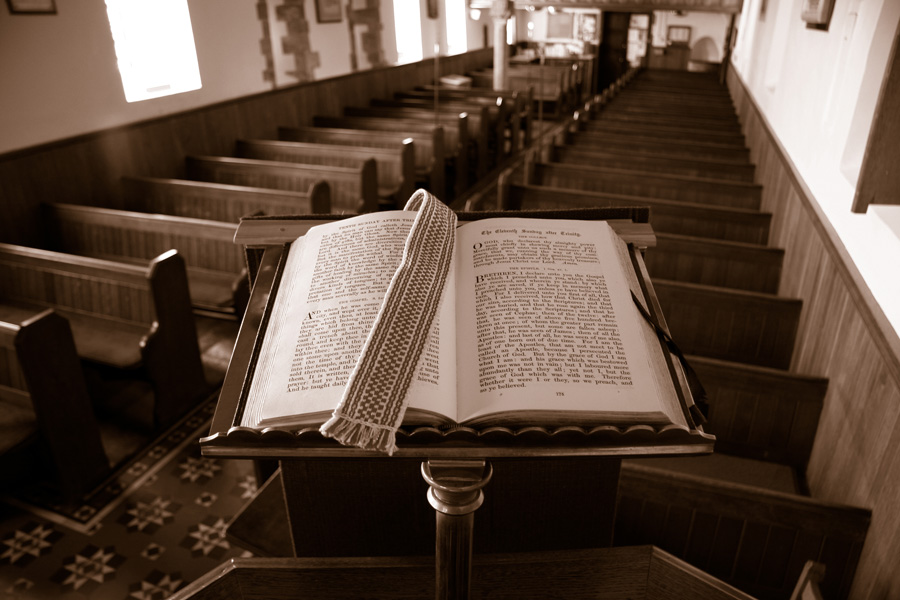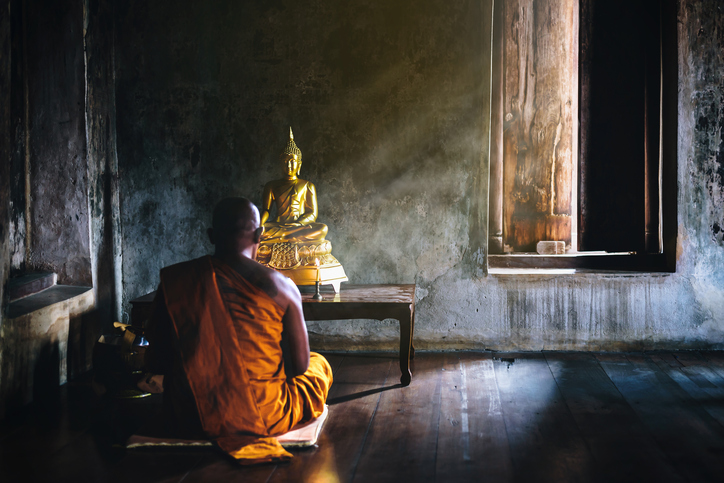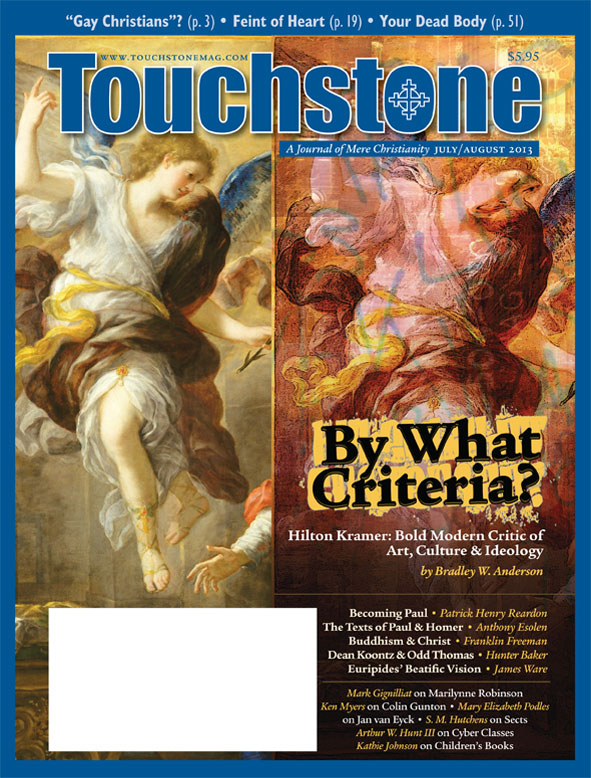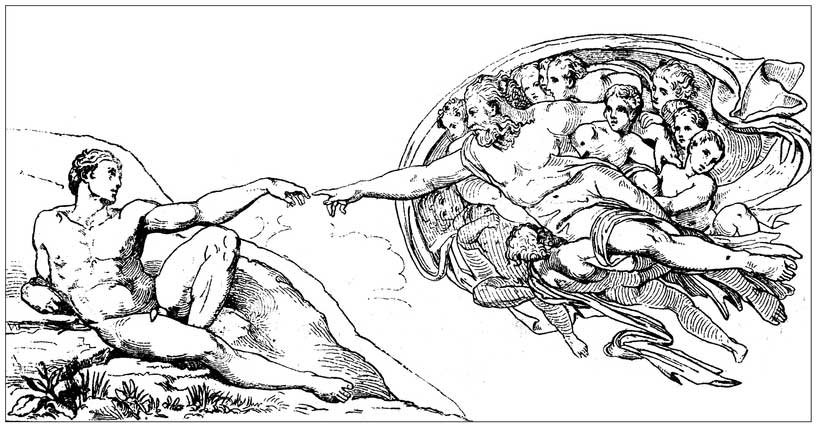Feature
The Door to Paradise
A Christian Reflection on the Attractions & Shortcomings of Buddhism
by Franklin Freeman
Buddhism is not an American, or even a Western, religion—some would say it is not a religion at all, rather a science of the mind—but it has nonetheless attracted American celebrity converts who are considered household names: Steve Jobs, Steven Segal, Oliver Stone, Sharon Stone, Tina Turner, and of course, the first celebrity convert, Richard Gere. And these are only a few.
It has also attracted people not as well known but perhaps of a deeper fiber, such as the Greek (though English-born) writer and musician Marco Pallis, and the American writers Peter Matthiessen, Robert Pirsig, and Charles R. Johnson, who are practicing Buddhists. It has also fascinated Christian monks such as Dom Aelred Graham and Thomas Merton.
Now, I am a Catholic Christian, a convert, but for a while I too was drawn to Buddhism. I was going to Mass on Sundays and sometimes praying, but I was also sometimes meditating Zen-fashion, and I felt spiritually schizophrenic. My daily life seemed to be more in tune with the tenets of Buddhism, but when I went to Mass and heard the Scriptures read and received Communion, I knew that these were things I didn't want to give up. A Zen priest had told me you could practice Zen without being a Buddhist, but I would not expect a Catholic priest to say you could practice Catholicism without being a Christian.
Now, after a lot of thought, reading, and prayer, I have settled into being a Christian, of the traditional orthodox sort. But I have learned a lot from my study of Buddhism and from contrasting it with Christianity. This essay is the fruit of that fascination.
First Longings
In his preface to Nine-Headed Dragon River: Zen Journals, 1969–1982 (1985), New Yorker writer and Zen Buddhist Peter Matthiessen wrote:
The sun glints through the pines, and the heart is pierced in a moment of beauty and strange pain, like a memory of paradise.
After that day, at the bottom of each breath, there is a hollow place that is filled with longing. We become seekers without knowing that we seek, and at first, we long for something "greater" than ourselves, something apart and far away. It is not a return to childhood, for childhood is not a truly enlightened state. Yet to seek one's own true nature is, as one Zen master has said, "a way to lead you to your long-lost home."
C. S. Lewis described the same experience in an essay titled "The Weight of Glory," only he called it "the inconsolable secret":
These things—the beauty, the memory of our own past—are good images of what we really desire; but if they are mistaken for the thing itself they turn into dumb idols, breaking the hearts of their worshippers. For they are not the thing itself; they are only the scent of a flower we have not found, the echo of a tune we have not heard, news from a country we have never yet visited. . . .
Our lifelong nostalgia, our longing to be reunited with something in the universe from which we now feel cut off, to be on the inside of some door which we have always seen from the outside, is no mere neurotic fancy, but the truest index of our real situation.
Matthiessen, I believe, would agree with Lewis about this longing being "the truest index of our real situation." Yet Buddhism begins in the interior and then works out to something outside ourselves. Moreover, the interior and the exterior turn out to be the same thing.
Go Inside
At first, we seek the source of our longing in "something 'greater' than ourselves," Matthiessen writes, "something apart and far away"; then we go inward and seek our own "true nature." He goes on to say that the way of Zen is to "realize one's own existence moment after moment" and that, through sitting meditation (zazen),
the clutter of ideas and emotions falls away and body and mind return to natural harmony with all creation. Out of the emptiness can come a true insight into the nature of existence, which is no different from one's Buddha nature. To travel this path, one need not be a "Zen Buddhist," which is only another idea to be discarded, like "enlightenment" and like "the Buddha" and like "God."
This shows that Buddhism, at the absolute level, does not distinguish between the idea of something and the reality. In the everyday, relative, phenomenal world, Buddhism admits that we must make these distinctions and that reality is, so to speak, real. But at a deeper level it says that the mental and the physical are the same. The ideal is the real; the real is the ideal. "We are what we think," the Buddha said in the Dhammapada (Byrom, 1993). "All that we are arises with our thoughts, / With our thoughts we make the world." What is real is not something outside us, but what's in our minds.
Because of this, Buddha's "salvation" comes through the care and nurture of our thoughts. The basics of Buddhism are the Four Noble Truths: (1) That life is full of suffering; (2) that suffering originates in disordered desire; (3) that disordered desire can be overcome; and (4) that the way to overcome it (which leads to Nirvana, the Buddhist equivalent of the Beatific Vision) is through the Eightfold Path, which consists of right knowledge, right aspiration, right speech, right behavior, right livelihood, right effort, right mindfulness, and right absorption or contemplation. Right behavior includes the Five Precepts: Do not kill; do not steal; do not lie; do not be unchaste; and do not get intoxicated.
No Self, Big Mind
Buddhism also says there is no eternally abiding self. It calls itself the Middle Way between eternalism—the idea that we do have an eternal self—and nihilism—the idea that reality is only physical. But there is something called Mind, or, in a sense, the Self. One Zen master, Shunryu Suzuki, in his classic Zen Mind, Beginner's Mind, called this the non-dualistic Big Mind, as opposed to our everyday, dualistic small mind. The seventh-century Chinese Zen master Huang Po said,
If you students of the Way do not awake to this Mind, you will overlay Mind with conceptual thought. You will seek Buddha outside yourselves, and you will remain attached to forms, pious practices and so on—all of which are harmful and not at all the way to Supreme Knowledge.
Or as Steve Hagen, Zen priest and author of Buddhism Is Not What You Think: Finding Freedom Beyond Beliefs (2003), writes,
If we would wake up [to be a "Buddha" means to be an awakened one] and see, we'd call this seeing enlightened Mind. But we shouldn't think we can retain our separate identities and have this kind of Mind.
In fact, the enlightened Mind has us. Even now, it has us all. It already holds everything that we see, hear, feel, and think. It is the Mind of the Whole, of Reality itself.
This Mind, however, doesn't have us, or anything in particular, in mind:
There is nothing outside this Mind. Hence, unlike our personal minds, which are so filled with longing and loathing, it doesn't lean toward or away from anything. It doesn't try to bring about anything in particular. Unlike our egotistically created notions of God, the Mind of the Whole—that is, Reality—is without will.
Projection & Naturalism
But could not this notion of Mind be a projection just as much as "God" is? We Christians may egotistically create notions of God, by Hagen's argument, but who is to say that Buddhists aren't doing the same thing with their notions of "the Mind of the Whole" and "Reality"? A passage from Lewis's Miracles (1947) points to this possibility:
I know that the hankering for a universe which is all of a piece, and in which everything is the same sort of thing as everything else—a continuity, a seamless web, a democratic universe—is very deep-seated in the modern heart: in mine, no less than in yours. But have we any real assurance that things are like that? Are we mistaking for an intrinsic possibility what is really a human desire of tidiness and harmony?
Buddhism, seeking to not define away the sense of mystery and ineffability of metaphysical realities, disdains to link the Absolute with the personal. But in so doing, it also does not explain the existence of personhood.
It thereby avoids a criticism that Christianity often faces, which is the possibility that perhaps God is just a projection of ourselves upon the emptiness of the universe. Did we make God in our image, or did he make us in his?
Is it more probable that we human beings arose from purely natural causes, or—given that we have a reasoning consciousness and language—from both nature and the rational super-nature that we ascribe to God?
Lewis writes in Miracles that Naturalism, the idea that matter is the only real thing, "professes to be a full account of our mental behavior; but this account, on inspection, leaves no room for the acts of knowing or insight on which the whole value of our thinking depends." Thus, "rationality is the little tell-tale rift in Nature which shows that there is something beyond or behind her." He writes further,
The Naturalists have been engaged in thinking about Nature. They have not attended to the fact that they were thinking. The moment one attends to this it is obvious that one's own thinking cannot be merely a natural event, and that therefore something other than Nature exists. The Supernatural is not remote and abstruse: it is a matter of daily and hourly experience, as intimate as breathing. [This is a very Zen-like statement, by the way.] Denial of it depends on a certain absent-mindedness. But this absent-mindedness is in no way surprising. You do not need—indeed you do not wish—to be always thinking about windows when you are looking at gardens or always thinking about eyes when you are reading.
Walker Percy expresses the same idea is his non-fiction works when he writes about the uniqueness of human language and the absurdity of trying to prove we are no different in a qualitative way from chimpanzees because we can teach them intricate sign languages.
Buddhism as Naturalism
Buddhism, in its most pure form, is a kind of naturalism. As Huston Smith wrote in The Religions of Man,
Buddha preached a religion devoid of the supernatural. He condemned all forms of divination, soothsaying, and forecasting as low arts, and refused to allow his monks to play around with any form of superhuman power. "By this ye shall know that a man is not my disciple—that he tries to work a miracle." For all appeal to the supernatural and reliance thereon amounted, he felt, to looking for short-cuts, easy answers, simple solutions that could only divert attention from the hard, practical task of self-advance. "It is because I perceive danger in the practice of mystic wonders that I loathe, and abhor, and am ashamed thereof."
This shows both that Buddhism is akin to Naturalism and that it is not as fatalistic and pessimistic as many portray it. While Buddhism does not see all nature as illusory, Lewis was right in Miracles when he said, "The more we respect his [the Buddha's] teaching the less we could accept his miracles."
Buddhism would not distinguish, however, between Nature and Super-nature as Lewis does. It might, at most, say that there's a difference relatively speaking, but not absolutely speaking—that is, to us, in our earthly life, there appears to be a difference between Nature and Super-nature, but there really isn't. You might suggest that this is another way of saying that God is immanent in all things, but Buddhism says there is neither immanence nor transcendence—there is only the here and now, this present reality, and Mind.
Forget Metaphysics
What Buddhism doesn't tell us is why we are here, where human beings come from, and why are we different from the rest of nature. It asks us, instead, to forget we are human and to seek to realize that we are, in fact, one with the wind or a falling leaf. We should seek to let go of all conceptual thought (but what other kind is there?) and just be in the present moment.
But the problem is that we aren't just a part of nature like the wind or a falling leaf. We are a part of it in that we are physical beings, but we are more in that we can say and reflect upon that fact. We stick out, so to speak, from nature like a sore thumb.
Gary Snyder, the Beat poet and also a practicing Buddhist, obliquely addresses this issue in The Practice of the Wild (1990) in a chapter about language having developed from tracks in the snow. A school of thought theorizes that humans developed language while hunting and tracking, that they "read" tracks and developed them first into sounds and then into symbols of meaning. It's a Naturalist's explanation of language that dovetails with a Naturalistic explanation of consciousness.
But this section of Snyder's book seems to me to have a desperate quality to it. Snyder seems aware of the possibility that our use of language is a sign that we are more than just another part of nature—that language reveals the "little tell-tale rift" that Lewis talks about—but he doesn't want this to be the case, and so he has latched onto the tracks-in-the-snow idea instead.
But for the most part, grappling with such questions does not matter to Buddhism. In fact, in his book Going Home: Jesus and Buddha as Brothers (1999), Thich Nhat Hanh expresses a certain impatience with the question of whether God or Nirvana is personal. It does not matter, he says; let's not get stuck on that. The Buddha discouraged such metaphysical speculation; he wanted to alleviate suffering if there was a way to. Buddhism is, in Huston Smith's words, "a transcendental pragmatism."
The Buddha said that if a man has been shot by a poisoned arrow and there is a doctor available to treat him, then it is foolish for the man to refuse to be treated until he knows who shot the arrow and why, what kind of arrow it was and what kind of poison was on it, and who made the arrows and what kind of feathers they used. The Buddha considered himself to be the doctor, and his message—the Four Noble Truths—the treatment that would cure us of suffering.
So Buddhism would say that my objections about personhood were beside the point, that all that mattered was to relieve suffering—mine, yours, and all the world's—which is another way of accepting reality as it is. The Buddha "resisted metaphysics on principle," Smith writes, "as a man with a mission might turn his back on avocations that would distract him from his central destiny."
Beyond Suffering to Christ
But is the most important thing in our existence to relieve suffering? Sometimes it seems so. I knew brief tastes of relief from self-consciousness when I was exploring Buddhism; and much of Scripture—more than I want it to be—focuses on the relief we Christians are supposed to provide for those who suffer.
Christianity, however, goes on to say that although we don't always know why we have to suffer, we do know we can redeem our suffering, give it meaning by how we respond to it.
But more than this, I still have a mind that hungers for truth, that wants to know the way things are. It wants to be in accord with what is. And personhood is one of those things it wants to know about. Surely it does matter whether or not God is of a personal nature. Only a person can know the sweetness (and bitterness) of a personal love, not just the mystery of a godhead. We all need the love of the God-Man, Jesus, who revealed himself in history by pitching his tent with us.
Here again, Buddhism excludes something, and that is history. Nowhere have I read a Buddhist writer grappling with Jesus' claims to divinity or with the historical claims of the Church. Hanh will refer to Christ's resurrection and what it "means," but always with a Buddhist twist. Its inner meaning, you feel when you read him, is all that matters. What does not matter to him is whether it really happened or not. Which makes sense, given that he is a Buddhist monk.
But when he goes on, in Living Buddha, Living Christ (1995), to chastise Pope John Paul II for emphasizing the uniqueness of Jesus over all other religious figures, saying that this is "not helpful" toward getting us to understand one another, you have to reply that any Christian has to maintain the uniqueness of Christ because Christ himself did. If I did not maintain it, I would no longer be a Christian. It's a sign of contradiction, a stumbling block, even if I don't like it sometimes.
It looks as though, as Charles Williams said in The Descent of the Dove (1939),the whole life, death, and resurrection of Jesus really happened in space and time. And if it really happened, then God is a community of Persons who loves us, and we can love him, Father, Son, and Holy Spirit, even in the midst of suffering.
To Paradise
For many, the search often begins with a "memory of Paradise," as Matthiessen put it, or by hearing "news from a country we have never yet visited," as Lewis phrased it. But that does not mean the seekers will end up in the same place, though all things are possible with God, as Jesus said, and even rich people can get into heaven through the eye of a needle.
I think Buddhism brings one to a place of impersonal bliss akin, perhaps, to what one feels when observing an approaching storm or a tumultuous seascape: a forgetfulness of self, a restfulness in just being. Christianity can give that as well, but it also promises a place of personal bliss, like a lover's embrace or a dance, although—and this is the hard part—the way to it leads through suffering and dying to the self. And the ultimate fulfillment comes after death.
I've read that Romano Guardini, the author of The Lord (1954), expected Buddhism to be the strongest alternative to Christianity in this age, and perhaps it is. But appealing as it is to many, it leaves out of its view of life too much that is human. We naturally want to know the why of things, and we want to know what happened in the past and what it means, if anything, to us.
We are not merely one with the wind, the falling leaf, but we are promised that they will be redeemed along with us through Christ. As St. Paul wrote to the Romans,
For the earnest expectation of the creature waits for the manifestation of the sons of God. For the creature was made subject to vanity, not willingly, but by reason of him who hath subjected the same in hope; because the creature itself also shall be delivered from the bondage of corruption into the glorious liberty of the children of God. For we know that the whole creation groans and travails in pain together until now. (8:19–22)
Creation is waiting for paradise. And this paradise is personal (but not private), its entrance having been marked by a personal invitation to a dying thief: "Today, you shall be with me in Paradise." One may decide to convert to Buddhism. But to convert to Christianity is to accept that personal invitation by saying, "Amen. Come quickly, Lord Jesus!" •
Franklin Freeman is a freelance writer living in Saco, Maine, with his wife and four children.
subscription options
Order
Print/Online Subscription

Get six issues (one year) of Touchstone PLUS full online access including pdf downloads for only $39.95. That's only $3.34 per month!
Order
Online Only
Subscription

Get a one-year full-access subscription to the Touchstone online archives for only $19.95. That's only $1.66 per month!
bulk subscriptions
Order Touchstone subscriptions in bulk and save $10 per sub! Each subscription includes 6 issues of Touchstone plus full online access to touchstonemag.com—including archives, videos, and pdf downloads of recent issues for only $29.95 each! Great for churches or study groups.
Transactions will be processed on a secure server.
more on christianity from the online archives

8.4—Fall 1995
The Demise of Biblical Preaching
Distortions of the Gospel and its Recovery by Donald G. Bloesch
more from the online archives
calling all readers
Please Donate
"There are magazines worth reading but few worth saving . . . Touchstone is just such a magazine."
—Alice von Hildebrand
"Here we do not concede one square millimeter of territory to falsehood, folly, contemporary sentimentality, or fashion. We speak the truth, and let God be our judge. . . . Touchstone is the one committedly Christian conservative journal."
—Anthony Esolen, Touchstone senior editor












